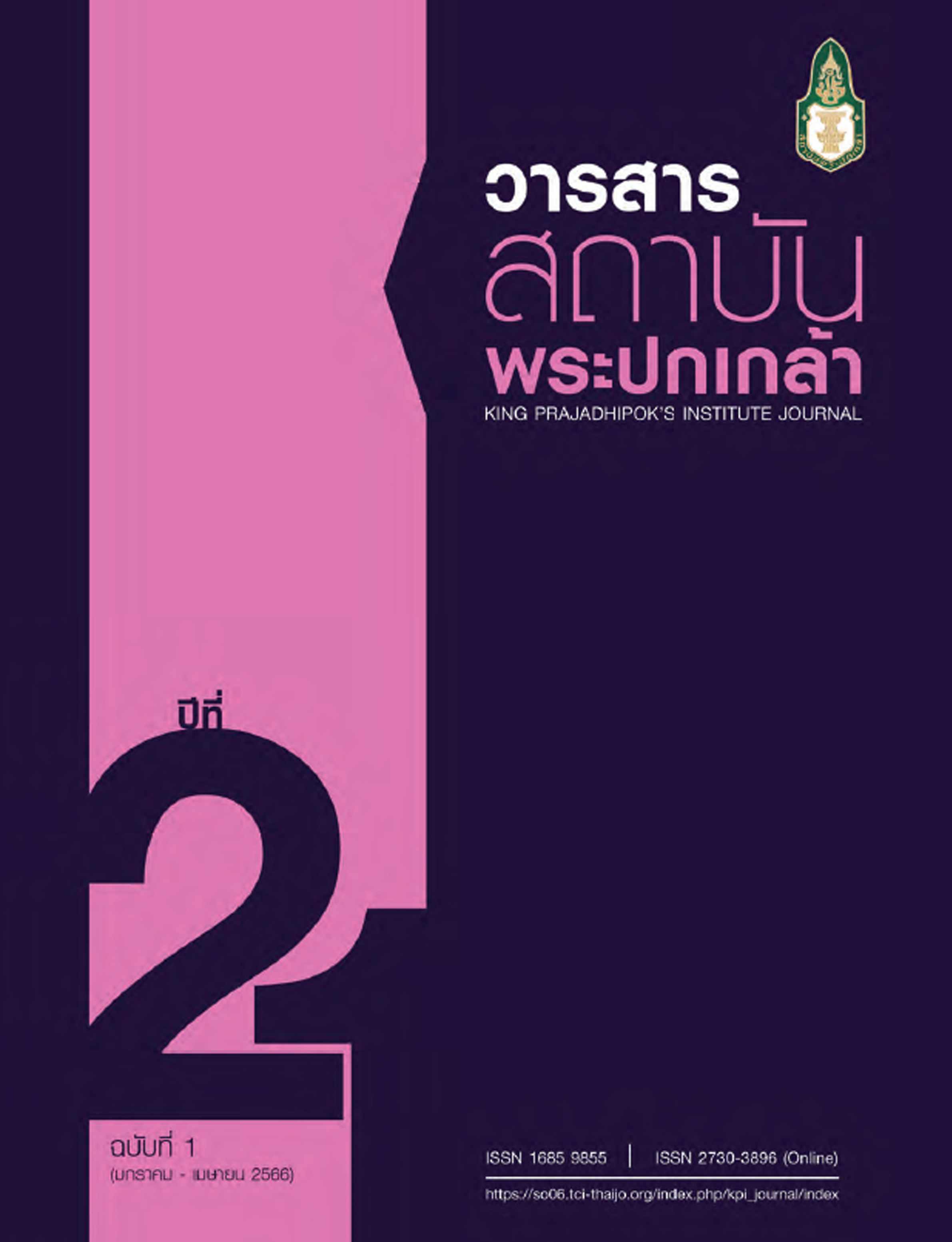A Study of the Role of Civil Society in Strengthening Societal Security and Democracy Development Anti-Corruption and Social Governance Organizations
Main Article Content
Abstract
The purpose of this research are to extract lessons learned, and propose appropriate guideline to develop the role and operation of civil society in order to enhance strong society and democratic development and also promoting good governance. Three major anti-corruption organizations that aim on anti-corruption mission and promote good governance over decades are selected. Firstly, Foundation for a Clean and Transparent Thailand. Secondly, People Network Against Corruption. Thirdly, Anti-Corruption Organization of Thailand. This research used qualitative methods. Data are gathered from an in-depth interview from 14 leaders and key stakeholders who worked in three organizations, a group discussion of 17 people who participated in the implementation of the organizations, and documented studies which analyze data with descriptive interpretations, content analysis and analytic induction.
The results find two points; (1) the case studies have initially similar role and operation, recognizing the importance and problem of corruption. All of them focus to either stand up or fight against corruption with concrete form and have a strong corporate network’s form. On the operating stage, they clearly adhere to the objectives and work on the implementation as indicated, trying to act in keeping with the organization's goals and maintain the standardized organization by using the available resources. On the sustainability stage, they have common strength factors such as the role of neutrality in politics, the quality of recruitment to select leaders and board of the organization, maintaining the transparency’s process of the organization, and continuously expanding the network of engagement. The major problems are 1) lack of realization and interest in corruption which directly affects participation and lead to low engagement 2) limited resources, particularly, the qualified staff who are determined to work against corruption. (2) proposing appropriate guideline to develop role and operation as follows; 1) setting up the significantly common goal with being neutrality in politics 2) requiring a clear and continuous policy from government to support role and operation 3) providing certification to endorse status for network of anti-corruption and social governance organizations by government agencies, establishing budget supporting which sets apart from politics, and 4) continuous research and develop works on role and operation in order to improve the efficiency for stability and sustainability.
Article Details

This work is licensed under a Creative Commons Attribution-NonCommercial-NoDerivatives 4.0 International License.
@ 2020 King Prajadhipok's Institute The Government Complex Commemorating All Right Reserved.
References
ภาษาไทย
กฤษฎา บุญชัย, วีรบูรณ์ วิสารทสกุล และจตุรงค์ บุณยรัตนสุนทร. (2556). รายงานการศึกษา บทบาทของภาคประชาสังคมในการคุ้มครองสิทธิพลเมืองและสิทธิทางการเมือง. กรุงเทพฯ:สำนักงานคณะกรรมการสิทธิมนุษยชนแห่งชาติ.
เกศินี ประทุมสุวรรณ และพีรพัฒน์ พันศิริ. (2563). การขับเคลื่อนประเด็นสุขภาวะระดับพื้นที่: บทเรียนจาก Node สสส. นครปฐม. วารสารสังคมสงเคราะห์ศาสตร์, 28(2), 136-163.
ขจรศักดิ์ บัวระพันธ์. (2554). วิจัยเชิงคุณภาพไม่ยากอย่างที่คิด. นครปฐม: สถาบันนวัตกรรมการเรียนรู้ มหาวิทยาลัยมหิดล.
คณะกรรมการร่างรัฐธรรมนูญ. (2560). รัฐธรรมนูญแห่งราชอาณาจักรไทย. กรุงเทพฯ: สำนักงานเลขาธิการสภาผู้แทนราษฎร.
คนึงนิจ ศรีบัวเอี่ยม, ถวิลวดี บุรีกุล, ถวัลย์รัฐ วรเทพพุฒิพงษ์, พัชรี สิโรรส, พิสิฐ ศุกรียพงศ์, และ โสภารัตน์ จารุสมบัติ. (2545). แนวทางการเสริมสร้างประชาธิปไตยแบบมีส่วนร่วมตามรัฐธรรมนูญ. กรุงเทพฯ: สถาบันพระปกเกล้า.
เครือข่ายประชาชนต้านคอรัปชัน. (2544). ฟื้นศักดิ์ศรีคนไทย ร่วมต้านภัยคอรัปชัน. ม.ป.พ.
เดช พุ่มคชา. (2542). บทบาทและอนาคตขององค์กรพัฒนาเอกชนไทย. ใน ณรงค์ เพ็ชรประเสริฐ(บรรณาธิการ), เอ็นจีโอ 2000 (59-76). กรุงเทพฯ: ศูนย์ศึกษาเศรษฐศาสตร์การเมือง คณะเศรษฐศาสตร์ จุฬาลงกรณ์มหาวิทยาลัย.
ณัฐฐ์วัฒน์ สุทธิโยธิน. (2556). ประชาสังคม: นิยาม ความหมาย และลักษณะของความเป็นประชา สังคม. สืบค้นจาก http://nattawatt.blogspot.com/2013/10/blog-post_3674.html
ถวิลวดี บุรีกุล. (2552). ประมวลสาระชุดวิชา ประชาสังคมและชุมชนท้องถิ่น หน่วยที่ 1-5. นนทบุรี: มหาวิทยาลัยสุโขทัยธรรมาธิราช.
ถวิลวดี บุรีกุล, พิชญ์ พงษ์สวัสดิ์ และสติธร ธนานิธิโชติ. (2555). เพิ่มพลังพลเมือง เพื่อขับเคลื่อน ประเทศไทย. กรุงเทพฯ: เอ.พี. กราฟิค ดีไซน์และการพิมพ์.
ไพรัตน์ ฉิมหาด, บัญญัติ แพรกปาน และสามิตร อ่อนคง. (2563). การเมืองภาคพลเมืองกับการมี ส่วนร่วมทางการเมืองในสังคมไทย. วารสารมหาจุฬานาครทรรศน์, 7(5), 46-61.
บงกช สุทัศน์ ณ อยุธยา. (2557). การสร้างจิตสำนึกของความเป็นไทย ค่านิยม เพื่อการต่อต้าน ป้องกันการทุจริตคอร์รัปชั่น. วารสารศรีนครินทรวิโรฒวิจัยและพัฒนา (สาขามนุษยศาสตร์ และสังคมศาสตร์), 6(11), 248-264.
รัตนะ บัวสนธ์. (2556). วิจัยเชิงคุณภาพทางการศึกษา. (พิมพ์ครั้งที่ 4). กรุงเทพฯ: สำนักพิมพ์แห่งจุฬาลงกรณ์มหาวิทยาลัย.
มูลนิธิประเทศไทยใสสะอาด. (2565). สรุปผลการดำเนินงานและงบประมาณค่าใช้จ่าย มูลนิธิประเทศไทยใส สะอาดปีงบประมาณ พ.ศ. 2564 (1 ตุลาคม 2563 – 30 กันยายน 2564). สืบค้นจาก https://drive.google.com/file/d/1lxKafWsdAyk7txoBN5-XxrtGOkl1S9t1/
view
สถาบันพระปกเกล้า. (2545). การกระจายอำนาจและการปกครองท้องถิ่นในประเทศไทย.กรุงเทพฯ: ธรรมดาเพรส.
สุภางค์ จันทวานิช. (2542). วิธีการวิจัยเชิงคุณภาพ. กรุงเทพฯ: โรงพิมพ์แห่งจุฬาลงกรณ์มหาวิทยาลัย.
องค์กรต่อต้านคอรัปชั่น (ประเทศไทย). (2565). ยุทธศาสตร์ 3 ป. สืบค้นจาก http://www.anticorruption.in.th/2016/th/ourjob.php#ourjob2_section
ภาษาอังกฤษ
Bernhard, M., Tzelgov, E., Jung, D.-J., Coppedge, M., & Lindberg, S. I. (2015). The Varieties of Democracy Core Civil Society Index. Gothenburg: The Varieties of Democracy Institute.
Diamond, L. (1994). Rethinking Civil Society: Towards Democratic Consolidation. Journal of Democracy, 5(3), 4-17.
Jensen, M. (2006). Concepts and Conceptions of Civil Society. Journal of Civil
Society, 2(1), 43.


